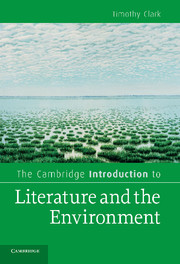Romantic and anti-romantic
Published online by Cambridge University Press: 05 June 2012
Summary
Romantic and ‘romantic’
Concern with the environment in the broad sense is necessarily as old as human culture. The initial impetus of modern ecocriticism, however, lies some two centuries in the past, in a broadly romantic tradition of opposition to the destructive tendencies of enlightenment ideals of the conquest of nature, the market-based economy and industrialism. Romantic here is meant both in the historical period sense – a complex cultural movement of the late eighteenth and nineteenth centuries – but also, as romantic with a small r, to name continuing and deeply engrained modes of thought that oppose industrial society with ideas of ‘nature’ and ‘the natural’ as modes of secular redemption.
Romanticism in that sense remains a powerful feature of mainstream culture. It is also, since the 1790s, a basis of the numerous forms of countercultural and alternative cultural movements appealing to notions of nature and the natural as norms of health, vitality or beauty and as precisely what commercial/industrial society represses or destroys, both in the human psyche and in the surrounding environment.
Such arguments have been the predominant context for environmental politics. Jonathan Bate writes: ‘if one historicizes the idea of an ecological viewpoint – a respect for the earth and a scepticism as to the orthodoxy that economic growth and material production are the be-all and end-all of human society – one finds oneself squarely in the Romantic tradition’.
- Type
- Chapter
- Information
- Publisher: Cambridge University PressPrint publication year: 2011

